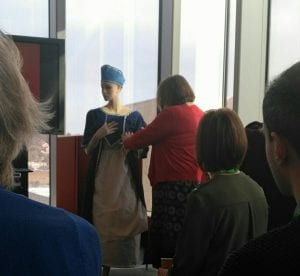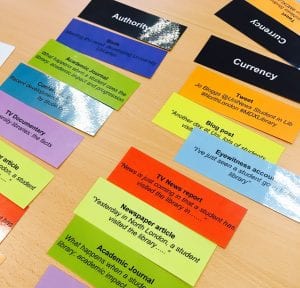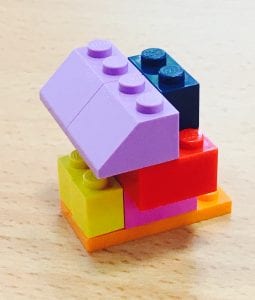Part One: Sharon’s feedback on the morning
On Thursday 22 February I attended a Customer Services Group UK (CSGUK) knowledge sharing event aimed at front-line staff with another UCL Language & Speech Science Library Assistant, Jon Siah. At this event we had the opportunity to hear from other Library Assistants about the projects they had created and implemented. Before they provided us with lunch there was also a guided tour of the University of Bedfordshire’s spacious new library at its Luton campus but the day started at 10am in a relaxed way with drinks, pastries and a chance to chat to the other participants, some of whom had come from as far as Cornwall and Swansea.

Luton campus library’s cloud foyer
The first presentation was ‘Managing Student Demands and Delivering Student Demands in a Converged Service’ by Louise Bailey from the University of the Creative Arts who talked about how the Library and Student Services (which includes academic support, finance and careers advice) are converged. This Gateway service comprises a mixture of Desk staff who provide students with a variety of academic and personal information and advice. For example, they are able to book a tutorial in person, by phone or by email with two Learning Development Tutors from the Library who are embedded in students’ courses and available to help in areas such as reading, writing, language development, assignments and lesson plans.
However, at busy times such as the weeks before dissertation deadlines, it was found that these tutors were fully booked but some students did not show up and others missed a chance to receive assistance. Because of this, Library Assistants developed a live Google spreadsheet that updates instantly from a waiting list of students if there are any no-shows. Staff on the Gateway Desk manage student expectations and explain the need to be flexible and students on the waiting list provide their deadline date and agree to be on campus during the relevant week so that they are on hand to attend a session. It was found that students greatly valued this collaborative arrangement as they felt involved, more assisted by staff and the system, and that they were taking responsibility for their own learning.

Playing library Snakes & Ladders
The second presentation was ‘Innovative Ways of Promoting the Library to New University Staff: Making Library Services Memorable’ (Monika Koziel and Martina Xenia Baldi, City, University of London). The presenters explained that at City there is a procedure in place to introduce all new staff, including admin and academics, to the university. This Welcome to City event includes a World Café at which eight university departments give regular 10-minute introductory presentations. Last year, one of these presentations was a Snakes and Ladders game created by Library Assistant Monica that also included a booklet with further information about the questions on the board and provided links to library resources. Because City has design standards, certain rules were followed such as using the Library colours and changing the font so that it was more readable. Copyright issues meant that Monica created all the images herself. This game was very popular with participants who enjoyed it so much they returned in their lunchbreak to play it again. Monica is currently adapting the game for another university who want to use it and, after conducting a feedback group with colleagues, it is also being considered for use in student inductions. Overall, it was found to be a less tiring way for staff to facilitate inductions and a more fun and interesting method for users to learn about the library.

The I’m Taking a Break card with space for students to fill out the time they left
The last presentation of the morning was ‘#thatsbetter – The I’m Taking a Break Card Story’ led by John Mason and Tim Spring who explained that, because Birkbeck University runs most of its courses in the evening, the library is always busy from 4pm onwards. In the past, various schemes have been tried during exam time to stop students reserving spaces by leaving their possessions at unused desks for long periods but these were not always successful. In this recent project, as well as having staff roving the library, an I’m Taking a Break card was created saying that the student would be away for up to 30 minutes and with a space for them to write down what time they left.

The back of the card has tips for students
Due to the popularity of the project and student demand, several batches of this card needed to be printed because users coming into the library quickly got into the habit of picking them up from the entrance desk. As a result, the I’m Taking a Break card is now being considered for the next round of exams because the project produced better seat availability, fewer complaints to staff and positive feedback from students who felt more involved in monitoring themselves, others and the library space.

Each floor has a Library Info Point
Before lunch we set off on a guided library tour, starting from the Cloud training room on the sixth floor all the way down to the electronic stacks in the basement. We were all impressed with the amount of room, the great facilities the users have access to and the variety of spaces and study areas. Above all, the day was inspiring because seeing the projects these Library Assistants had devised demonstrated the hard work, skills and talent front-line staff bring to the running of university libraries. My colleague Jon continues this blog by reporting on the afternoon presentations and library tour so keep reading for more interesting info.
Part Two: Jon Siah’s feedback on the afternoon
Sharon and I were led on a tour of the impressive new library building, spiralling down through the concrete cavern until we were in the basement trying our hands at operating the electronic rolling stacks. If getting them to work was an intelligence test at which we failed miserably, then once we had finally figured out the controls, testing whether or not there was a safety mechanism by standing in between them as they slowly closed in was a test of bravery in which we redeemed ourselves. Although that said, acting out the garbage disposal scene from Star Wars, was perhaps not the best display of intelligence either. Importantly, no one was hurt, since as predicted, there is an ankle level buffer that detects humanoid forms. So we continued on the grand tour, making our way back up through each light and airy level and beginning to feel a little sleepy after the morning’s exertions. Fortunately, a state of the art place like this has a solution, which we found in the shape of the grand union between the dentist chair and a giant motorcycle helmet (see pic below).

Jon in the Bed Zzzone
So, after a few minutes in the Bed Zzzone, visor down and ambient music 4 playing through the speakers, one felt rejuvenated and ready for the next task of the day – lunch. It was a generous spread, but alas, there is no photographic evidence of this, since it was devoured before we thought of capturing the selection of quiches for posterity.

Laura Harvey and mannequin
On to the afternoon sessions, beginning with a talk addressing the elephant in the room, the newly dressed mannequin (modesty restored over lunch in full matron style), as an example of the types of costumes that Bedfordshire University has in its Teaching Practice Collection. Laura Harvey’s insightful talk started with the history of the institution, which began its life as Bedford Physical Education College, founded in 1903 by Mary Stansfield (who was encouraged to teach whilst a school pupil in Bloomsbury, of all places…), enrolling 12 young women to study the remedial and educational values of gymnastic exercise. Laura then went on to describe the development of the institution up until its present day status as a centre for teacher training. This involves having a large lending collection of materials and resources that budding young pedagogues need for their lessons, including topic boxes, story sacks and historical and multicultural costumes. The latter of which the team at Bedford do a great service of mending themselves by hand, whilst the collection itself is even kept in a mock-up classroom!
The next presentation was by Marina Burroughs from the University of East London, who talked about gaining the Higher Education Accreditation for her work as a Library Assistant. Knowing that the job involves a large teaching and learning component, she thought like many of us, that the work we do deserves proper recognition. Therefore, it was great to hear her talk about how she and her colleagues worked towards and gained the accreditation, since this is something that many of us at UCL have been thinking about doing or have begun applying for.

Jon uploads onto the cloud
Rees Arnott-Davies and Iraj Sheni Mansouri rounded off the day with a discussion of the recent change to a Full Service Model for Evenings and Weekends at Birkbeck. Their team had identified a number of issues for a while, including the tendency of students to approach Shelvers (with those wielding metal trolleys often being the most visible) to ask for assistance; only for them to be directed towards the Issue Desk, then perhaps redirected to the Help Desk, and that this pinball system was probably not the best customer service. Therefore, they decided to do away with Grade 2! Thus promoting all Shelvers to Library Assistants and others to Supervisors and ensuring that every member of the team is trained to do all aspects of the role and share each responsibility. It is certainly an interesting and bold move, and nicely encapsulates the spirit of the day – “Ideas from the sharp end.” Showing how innovation led by those who actually interact with library users on a daily basis is not just possible, but judging by the positive feedback they have received from students, also highly successful.
If you would like to read up more about any of these presentations, you can find all the slides on the CSGUK website: https://www.customerservicesgroup.co.uk/ideasfromthesharpend1
University of Bedfordshire, Luton campus library: https://www.beds.ac.uk/works/projects/lutonlibrary
 Close
Close



















